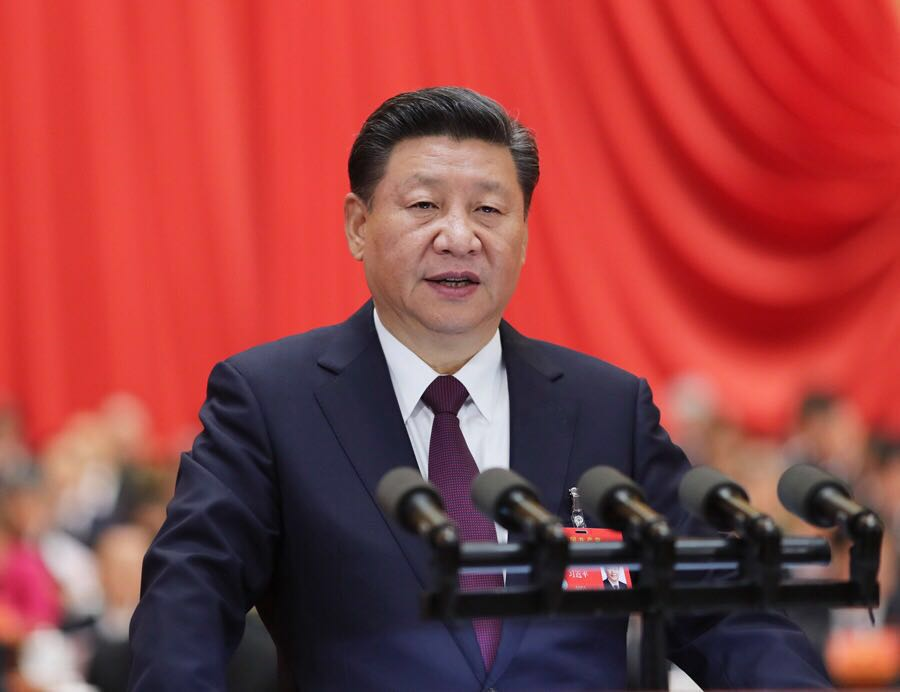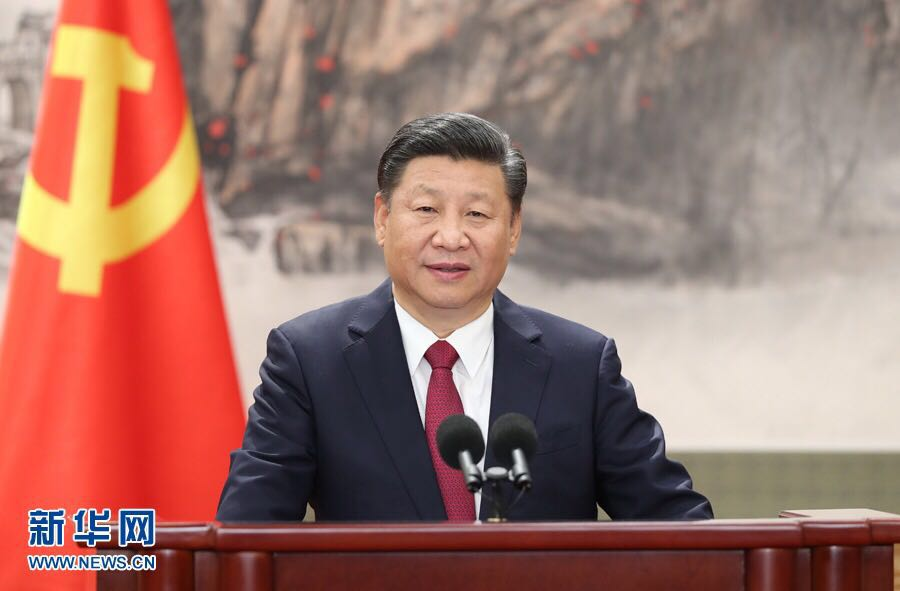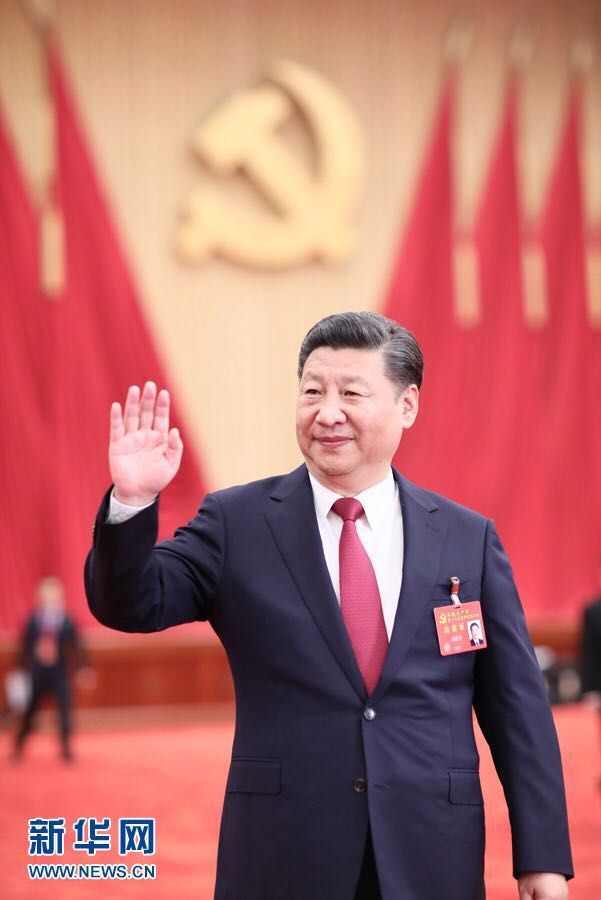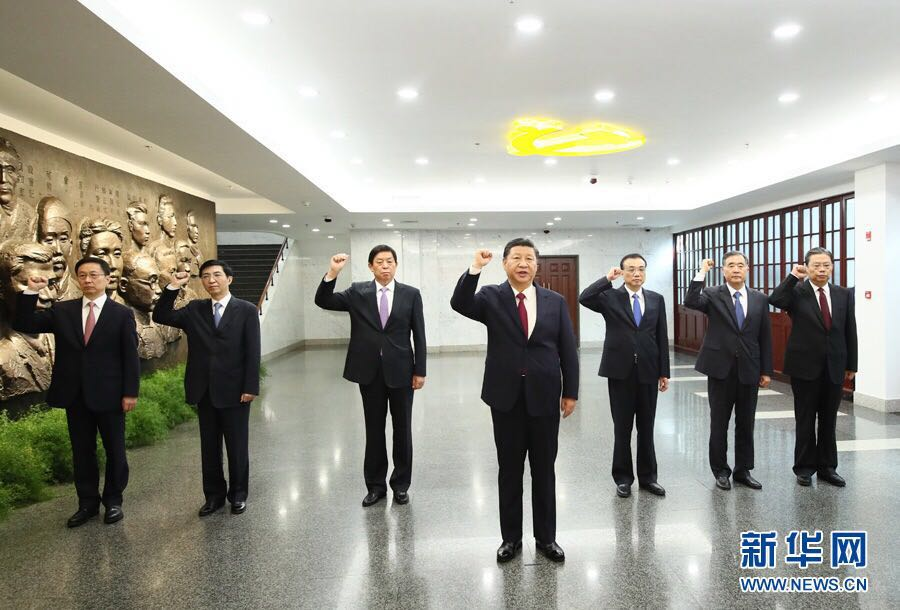
Photo: Xinhua
On the morning of Oct. 18, Xi Jinping, standing behind a lectern in the Great Hall of the People, delivered a report to the 19th National Congress of the Communist Party of China (CPC).
The 32,000-character report, the most significant of its kind in recent decades, drew more than 70 rounds of applause from delegates.
In the report, Xi said socialism with Chinese characteristics had crossed the threshold into a new era.
"This is a new historic juncture in China's development," he stated.
The report has been translated into 10 foreign languages. Most of the translators and foreign linguists involved used the word "powerful" to describe their first impressions.
"I was absorbed the first time I read it. I read from morning till midnight, even forgetting to have meals," said linguist Olga Migunova from Russia.
U.S. expert on China studies and chairman of the Kuhn Foundation, Robert Lawrence Kuhn, said that with this political report and the congress, Xi, who is the core of the CPC Central Committee and of the whole Party, sees China as standing at a new historic starting point.
At the first plenary session of the 19th CPC Central Committee on Oct. 25, Xi was re-elected general secretary of the CPC Central Committee for a second term, a reflection of the will of the entire CPC. Media and observers, at home and abroad, see Xi as the right man to lead China from being "better-off" into a great modern country.

Photo: Xinhua

Photo: Xinhua
In 1949, Mao Zedong announced the founding of the People's Republic of China, marking the end to a century of humiliation at the hands of foreign aggressors.
Deng Xiaoping, who put forward the reform and opening-up policy, then paved the way for the nation to become rich.
The coming five years between the 19th and the 20th Party Congress is the period in which the timeframes of the Two Centenary Goals will converge, Xi said when presenting the new CPC central leadership to the press.
"Not only must we deliver the first centenary goal, we must also embark on the journey toward the second," he said, promising to work diligently to "meet our duty, fulfill our mission and be worthy of CPC members' trust."
He stressed that Chinese Communists "must always have a youthful spirit, and forever be the servants of the people, the vanguard of the times and the backbone of our nation."
A MAN WHO MAKES THINGS HAPPEN
Five years ago, Xi, referred to by media as the first CPC chief of the social-media era, led the newly-elected members of the Standing Committee of the 18th CPC Central Committee Political Bureau to meet the press.
"In just a few minutes, the man who will lead the world's most populous nation for the next 10 years laid out his agenda. In short: to make the Chinese nation great again, address the grievances of the people and root out corruption.... Mr. Xi used simple language easily understood by non-Party members," said the Financial Times.
"He does seem to have the personality and political strength to start quickly and out of the box," the report quoted expert on Chinese politics at Boston University Joseph Fewsmith as saying. While praising his relaxed and confident demeanor, five years ago many took a wait-and-see attitude, as the new Chinese leader faced a plethora of headaches: a slowing economy, a widening wealth gap, corruption, and environmental woes.
The waiting and seeing is now well and truly over. Already some speak of "historic change" when describing what happened in the ensuing 1,800-odd days.
A total of 360 major reform plans were put forward and over 1,500 reform measures launched, establishing a general framework for reform in major fields and lending greater impetus to growth.
The economy expanded at an average annual rate of 7.2 percent between 2013 and 2016, outstripping the 2.5-percent average global growth.
More than 60 million people have bid goodbye to poverty.
Hundreds of officials at or above provincial or corps level have been investigated for corruption and a campaign targeting undesirable working styles has ensured that the Party with over 89 million members stayed pure and grew stronger.
The two million-strong Chinese military has reshaped its way of thinking and work style, organizational form and armament.
The "strictest environmental protection system" was put in place and numbers of officials were punished for insufficient work in this regard.
Moreover, the country made major progress in scientific and technological fields, seeing successes with a space lab, submersible, radio telescope and quantum satellite.
For the first time in over six decades, leaders across the Taiwan Strait met in person.
China is developing a new type of relations between major countries with the United States and Russia.
The Chinese currency, the renminbi or yuan, joined the IMF Special Drawing Right (SDR) basket. A proposal regarding a community with a shared future for mankind and the Belt and Road Initiative were incorporated into UN documents.
None of these were easy, but Xi and his colleagues have made things happen, with Xi's unshakable will and commitment crucial to the cause. "If the Party and people need us to devote ourselves, we shall do it with no hesitation... If we cannot do it, then how can we ask others to do it?" Xi once said at a meeting attended by members of the CPC Central Committee Political Bureau.
Xi's roadmap for China's future is inspiring: a two-step approach to becoming a "great modern socialist country," once a moderately prosperous society in all respects is established by 2020. Socialist modernization will be basically realized from 2020 to 2035. From 2035 to the middle of the century, China will become a great modern socialist country that is prosperous, strong, democratic, culturally advanced, harmonious and beautiful.
By then, China will be a global leader in terms of composite national strength and international influence. Prosperity for everyone will be basically achieved, a prospect that the Chinese nation has been longing for since the Opium War (1840-1842).

Photo: Xinhua
At this point, Xi is the unrivalled helmsman who will steer China toward this great dream.
Xi has been described by the media as "energetic," "ambitious," "sober-minded," and a "pathfinder."
He received the highest rating among 10 world leaders in a survey published by the Harvard Kennedy School's Ash Center for Democratic Governance and Innovation. He also topped the domestic ratings that respondents gave to their own leaders.
A Nikkei report on Oct. 19 said Xi had drawn up the blueprint for the country's development over the next 30 or so years and was expected to ensure that China regains its status as a global power.
CPC CORE FORGED DURING "GREAT STRUGGLE"
When Xi assumed office five years ago, his top priority was to ensure that the whole Party shall obey the Central Committee and uphold its authority and its centralized, unified leadership. The Party had to face up to its lack of drive, incompetence, disengagement from the people, inaction, and corruption. Of those failings, corruption became the biggest challenge. In Xi's opinion, if corruption got any worse, it would cause the collapse of the Party and the fall of the state. Achieving any target in the new era would be impossible.
The campaign against corruption was like no other in the 96-year CPC history, and remains as far-reaching and relentless as any such campaign anywhere in the world. One of the first "tigers" -- senior corrupt officials -- to fall was Li Chuncheng, former deputy secretary of the CPC Sichuan provincial committee. He had served as an alternate member of 18th CPC Central Committee for less than a month when he was put under investigation in December 2012. Soon, probes of centrally administered officials became an almost regular occurrence. Once as many as seven "tigers" fell under the gaze of investigators in a single month.
Even though the public had witnessed the full force of the campaign, the announcement in July 2014 that Zhou Yongkang, former member of the Standing Committee of the CPC Central Committee Political Bureau, was under investigation came as a bolt from the blue. Previously, Chinese people had doubted that the CPC would investigate officials at such a high level. The international community had not expected that Xi, still quite new to his office, had the capability or resolve to take out such a "big tiger."
Over the past five years, a number of officials with "iron hats" -- those who were considered powerful and not easily removed -- have been felled for corruption. Besides Zhou Yongkang, there were Bo Xilai, Guo Boxiong, Xu Caihou, Sun Zhengcai and Ling Jihua. A total of 43 members and alternate members of the 18th CPC Central Committee as well as nine members of the Central Commission for Discipline Inspection (CCDI) have been investigated.
Dispelling any doubt, Xi said, "If we did not offend hundreds of corrupt officials, we would offend 1.3 billion Chinese people." To those who worried that corruption would impede economic development, Xi said, "As far as I see, the sky will not fall."
Xi's path has been far from smooth. Rather, it is one of "struggle," a word which appeared 23 times in his report to the 19th CPC National Congress.
In 2015, the anti-corruption drive was described as at "a stalemate." In 2016, the CPC was "gaining ground to overcome corruption." Today, the anti-corruption campaign has built into a crushing tide, is being consolidated, and continues to develop. Fugitives overseas have found themselves hunted down and captured. Domestically, thousands of officials confessed to disciplinary authorities on their own initiative.
While some suggested taking a breather as long as some progress has been made, Xi said the Party must not leave well enough alone in front of an early harvest. Rather, the Party must fight for a "sweeping victory" over corruption. A popular cartoon on the Internet shows Xi on top of a tiger and punching the beast with his fist.
According to the National Bureau of Statistics, about 75 percent of Chinese people were satisfied with the anti-corruption efforts in 2012. The figure had risen to 92.9 percent by 2016.
Xi does not only rely on taking out "tigers" and swatting "flies" -- low-level corrupt officials -- to win people's support.
In early 2013, when Xi read an article, "Netizens call for curbing food waste" carried by Xinhua News Agency, he gave the instruction that "waste must be stopped." He stressed eradicating waste in public funds. After five years of hard work, the CPC checked the unhealthy trend, a mission once believed to be impossible.
Yang Xiaodu, deputy secretary of the CCDI, declared: "People said public funds spent on recreational activities like dinners and drinking could be about 200 billion yuan every year, but no one knew how to curtail it. With the eight-point regulation on frugality, the problem has been solved."
The regulation made explicit requirements on how officials should improve their work in eight aspects, focusing on rejecting extravagance and reducing bureaucratic meetings and empty talk.
"The eight-point regulation has changed China," Yang said.
"The people have granted power to us, so we must devote our lives to the Party and the country, and serve the Party and the country worthily. We must do what we should. If our work needs us to offend some people, we must offend them," Xi said.
Xi meant what he said. He relaunched the mass-line campaign to bring Party officials closer to the people. He urged officials to meet "strict" and "earnest" requirements: to be strict with oneself in practicing self-cultivation, using power, and exercising self-discipline; and to be earnest in one's thinking, work, and behavior. The Party required all its members to have a solid understanding of the Party Constitution, Party regulations, and major policy addresses, and to meet Party standards of behavior.
The CPC will run a campaign on "staying true to our founding mission" to enable all the Party members to arm themselves with new Party theories and become more purposeful in working tirelessly to accomplish the historic Party mission.
The Party has revised its regulations on disciplinary punishments and code on honesty and self-discipline. Those keen on officialdom are losing power and influence. Over the past five years, more than 5,000 "naked officials"-- those whose spouses and children are overseas -- have been removed from their posts. More than 22,000 officials at or above county-level had their posts rearranged on the basis of their performance.
Xi's status as the core of the CPC Central Committee and the whole Party was endorsed at the sixth plenary session of the 18th CPC Central Committee. It is widely acknowledged that when such a big Party as the CPC governs such a big country, difficulties are inevitable. Without a strong core of leadership, it is hard to maintain unity of Party thinking and solidarity across the entire nation. Weak leadership makes any achievement impossible, not to mention victory in a "great struggle with many new contemporary features."
Xi's indomitable spirit originates from his faith in Marxism. One of his colleagues noted in an article that Xi's speeches "exuberate with firm belief in communism and socialism."
When visiting "The Road Toward Renewal" exhibition at the National Museum on Nov. 29, 2012, Xi told a story about Chen Wangdao, who was so focused on translating The Communist Manifesto that he found himself eating ink instead of brown sugar. Xi quoted Chen's words: "The taste of truth is so sweet."
Xi also draws strength from his parents Xi Zhongxun and Qi Xin, both of whom participated in the revolution at young ages. In 1962, Xi Zhongxun's 16 years of suffering from political persecution began. However, he never gave in to adversity and ultimately helped clear the names of others who were persecuted.
When his father was wronged, Xi Jinping went through some tough times.
In one of his letters to his father, Xi Jinping noted that even when trapped in hard times, Xi Zhongxun still held "unswerving faith in communism and belief in the Party's greatness, correctness and glory."
"Your words and actions have pointed the correct direction for us to go forward," he wrote.
Xi also recollected that, when he was five or six years old, his mother bought him picture books about Yue Fei, a patriotic military commander of the Southern Song Dynasty (1127-1279), and the story of how Yue's mother tattooed four Chinese characters on his back to remind him of devoting himself to the country.
"Jing Zhong Bao Guo (To serve the country with total loyalty): I have long remembered these four characters. It is the pursuit of my entire life," Xi said.
During his early life, Xi applied to join the Communist Youth League eight times and the CPC 10 times, before he finally joined the Party at the age of 20.
(More)


